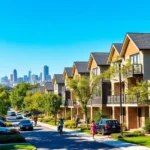Is Detroit living in really worth it? Shocking truths you need to know
- Detroit’s Reputation: Why Is It Seen as a Dangerous City?
- The Real Numbers: Crime and Safety in Detroit Today
- Cost of Living in Detroit: Is It Worth the Risk?
- Neighborhoods Breakdown: Where to Live and What to Avoid in Detroit
- Is Detroit a Good City? Assessing Its Livability
- Is Detroit a Nice Place to Live? Perspectives on Quality of Life
- What Is It Like Living in Detroit? A Closer Look at Daily Life
- How Safe Is Detroit? Key Safety Insights
- Is Detroit Really That Dangerous? Understanding the Risks
- Safety Tips and How to Navigate Detroit’s Risks
- Detroit’s Comeback Story: Signs of Hope and Growth
- Comparing Detroit to Other Dangerous Cities in the US
- Opinions From Real Detroit Residents and Visitors
- Is Detroit Living In Really Worth It?
- Sources and Further Reading
Detroit’s Reputation: Why Is It Seen as a Dangerous City?
Detroit often pops up in conversations about dangerous cities in the US, and that reputation didn’t come out of nowhere. Historically, Detroit was a booming industrial hub, famously known as the Motor City. But decades of economic downturn, population loss, and urban decay led to a steep decline. The city’s bankruptcy in 2013 marked a low point that grabbed national headlines.
What makes a city “dangerous” usually boils down to crime rates, economic struggles, and visible signs of decay. Detroit’s challenges fit that mold, but it’s important to see how it stacks up against other sketchy cities in America like Baltimore, St. Louis, Oakland, and Memphis. Each has its own story and struggles, but Detroit’s story is unique.
Media and pop culture have played a big role in shaping Detroit’s gritty image. Movies like “8 Mile” and various TV series often highlight the city’s tough streets and rough neighborhoods, sometimes exaggerating for drama. This has cemented a perception that Detroit is wild and risky, but the reality is more nuanced.
Many misconceptions float around about crime and safety. While some neighborhoods do face challenges, others are surprisingly safe and vibrant. Understanding the difference between rough neighborhoods in Detroit and safer areas is key to getting the full picture. For those wondering, is detroit a safe city, detroit is it safe, or asking is detroit really that dangerous, it's essential to look beyond stereotypes and explore the diverse experiences within the city.
The Real Numbers: Crime and Safety in Detroit Today
Looking at the latest crime statistics, Detroit still reports higher rates of violent and property crime compared to the national average. Gang-related violence is a concern in some areas, but it’s not citywide. The police department has increased community policing efforts, aiming to build trust and reduce crime hotspots.
Breaking down crime by neighborhoods reveals a patchwork. Some areas are known for incidents and require extra caution, especially at night or in poorly lit zones. Others have active neighborhood watches and community programs that help keep streets safer.
Residents often rely on street smarts, staying alert and locking doors, especially in shady spots. Local initiatives, like community patrols and youth programs, also play a role in improving safety.
| City | Violent Crime Rate (per 100k) | Property Crime Rate (per 100k) | Community Policing Efforts |
|---|---|---|---|
| Detroit, MI | 1,965 | 4,500 | Active, expanding |
| Baltimore, MD | 1,800 | 3,900 | Moderate |
| St. Louis, MO | 1,900 | 4,200 | Growing |
| Oakland, CA | 1,700 | 3,800 | Strong |
For everyday life and travel, “danger” often means being cautious in certain neighborhoods after dark, avoiding isolated streets, and using common sense. Many Detroiters live full lives without incident by following these simple safety habits.
Cost of Living in Detroit: Is It Worth the Risk?
Detroit’s cost of living is about 3% higher than the national average, but that’s mostly due to healthcare and groceries. Housing is the standout: rent averages around $1,559 a month, and homes sell for roughly $105,000 — about 76% below the national average. That’s a huge draw for people looking for affordable urban living.
Programs like down payment assistance and home repair loans make buying and fixing homes more accessible. This has helped many residents invest in their neighborhoods and build community pride.
Groceries cost about 1% more than average, while healthcare runs roughly 6% higher, with eye and dental visits averaging $95 and $130 respectively. Utilities and transportation costs vary but tend to be reasonable overall.
The trade-off is clear: cheaper homes but higher risks in some areas. Detroit’s low unemployment rate (around 2.6%) is promising, but the job market can be slow, so having a job lined up before moving is wise.
Real residents often share stories of balancing the affordable cost of living with the need for vigilance. For many, the savings on housing outweigh the challenges.
Neighborhoods Breakdown: Where to Live and What to Avoid in Detroit
Detroit’s neighborhoods vary widely. Some are great for families, young professionals, and creatives, offering community events, parks, and growing arts scenes. Others are known as trouble areas in Detroit, where residents advise caution.
Many people who say they’re from Detroit actually live in the suburbs, where crime rates tend to be lower and amenities more plentiful.
| Neighborhood | Crime Level | Amenities | Community Vibe |
|---|---|---|---|
| Midtown | Moderate | Restaurants, museums, parks | Vibrant, artsy |
| Downtown | Moderate | Entertainment, offices, sports | Busy, urban |
| Brightmoor | Higher | Limited | Struggling, rebuilding |
| East English Village | Lower | Schools, parks | Family-friendly |
Newcomers should consider what matters most: safety, affordability, community, or access to culture. Visiting neighborhoods at different times and talking to locals can help make a smart choice.
Is Detroit a Good City? Assessing Its Livability
When asking if Detroit is a good city, the answer depends largely on individual expectations and lifestyle preferences. Detroit offers a strong sense of community, rich cultural heritage, and affordable living options that many find appealing. The city’s ongoing revitalization efforts have improved quality of life in certain neighborhoods, making it a good city for those who value urban revival and diversity.
However, challenges such as crime rates and infrastructure issues remain, so it’s crucial to weigh these factors. Detroit’s strengths in arts, music, and local entrepreneurship contribute positively to its reputation as a good city for people seeking opportunities in these areas.
Is Detroit a Nice Place to Live? Perspectives on Quality of Life
Is Detroit a nice place to live? This question often draws mixed responses but highlights some important qualities. Many residents praise Detroit’s affordability, cultural vibrancy, and strong community ties as reasons the city is a nice place to live. The growing number of green spaces, arts initiatives, and revitalized neighborhoods contribute to a welcoming atmosphere.
Yet, the answer varies by neighborhood and personal priorities. Some parts of Detroit still face significant safety and economic challenges, which can affect day-to-day life. For those prioritizing affordability combined with urban culture, Detroit can be a very nice place to live despite its imperfections.
What Is It Like Living in Detroit? A Closer Look at Daily Life
For those asking what is it like living in Detroit, daily life here is a mix of challenges and vibrant culture. Most Detroiters drive to work — about 93% rely on cars — with an average commute of 22 minutes, which is actually quicker than the national average. Public transit use is low (around 4%), and biking or walking can be challenging due to infrastructure and safety concerns.
Winters are brutal, with heavy snow and cold temps. Locals prepare by winterizing homes and cars and embracing indoor activities. Pollution is a concern, but efforts to green the city are underway.
Detroit’s music, arts, and food scenes are a source of pride and survival. Sports teams like the Lions and Tigers bring the community together, especially during tough times.
Despite some rough-around-the-edges surroundings, many residents describe a strong sense of community and resilience. Local events and grassroots activities show Detroiters’ commitment to positive change.
Real voices from Reddit and other forums often mention friendliness, affordability, and cultural richness, balanced with a need for caution in certain areas. For those curious about what’s it like living in Detroit, it’s a city that demands awareness but rewards engagement.
How Safe Is Detroit? Key Safety Insights
Understanding how safe is Detroit requires looking at both statistics and lived experience. While Detroit has higher violent and property crime rates than many other cities, safety varies widely by neighborhood. Many residents report feeling safe in their communities by practicing common sense precautions and participating in local safety programs.
Here are some important points to consider about Detroit’s safety:
- Community policing initiatives are expanding to improve trust and reduce crime.
- Safety is often about awareness: avoiding risky areas after dark, locking doors, and staying alert.
- Neighborhood watches and local patrols contribute to safer streets in many parts of the city.
- Crime hotspots exist but do not define the entire city.
- Many Detroiters live full, safe lives by balancing vigilance with engagement in their communities.
For those wondering, “is Detroit a safe city?” the answer is nuanced but generally positive when proper precautions are taken.
Is Detroit Really That Dangerous? Understanding the Risks
Addressing the question is Detroit really that dangerous requires context. While crime rates are higher than average, the danger is not uniform across the city. Many neighborhoods are quite safe, and residents often share stories of community and improvement. The perception of Detroit as a dangerous place is partly rooted in historical struggles and media portrayals but doesn’t represent the full reality.
Safety in Detroit depends heavily on location, time, and vigilance. For example, areas like East English Village and parts of Midtown tend to have lower crime rates and more family-friendly environments compared to neighborhoods with higher challenges. Knowing what is Detroit like in terms of safety means recognizing this patchwork nature and making informed choices.
For newcomers and visitors, staying alert is key. Lock doors, avoid poorly lit streets, and steer clear of shady spots, especially at night. Engaging with local police and community groups can enhance safety.
Apps and websites track crime trends and neighborhood safety, helping residents stay informed. In emergencies, knowing local resources and contacts is crucial.
Compared to other hardcore cities in the States, Detroit’s safety challenges are real but manageable with the right precautions and community support.
Detroit’s Comeback Story: Signs of Hope and Growth
Detroit is on the rise again. New jobs and investments are flowing in, with major projects like the $1.5 billion Hudson’s Site and lakefront park developments improving quality of life.
Green spaces and bike-friendly initiatives are making the city more livable. Cultural revitalization is vibrant, especially in historically Black neighborhoods, with retail and arts districts blossoming.
Community programs support home ownership and neighborhood safety, helping residents take pride in their city.
Detroit balances its gritty past with a hopeful future, showing that living in Detroit means being part of a city rebuilding itself with heart.
Comparing Detroit to Other Dangerous Cities in the US
Here’s a quick look at how Detroit stacks up against other rough-and-tumble towns like Chicago, Baltimore, St. Louis, Cleveland, Philadelphia, Oakland, Birmingham, and Memphis:
| City | Violent Crime Rate | Cost of Living | Community Efforts | Economic Outlook |
|---|---|---|---|---|
| Detroit, MI | High | Lower than average | Growing | Improving |
| Chicago, IL | High | Higher than average | Strong | Stable |
| Baltimore, MD | High | Average | Moderate | Challenged |
| St. Louis, MO | High | Lower than average | Growing | Mixed |
Detroit’s unique mix of affordability, culture, and ongoing revival attracts people willing to accept some risks for opportunity.
Opinions From Real Detroit Residents and Visitors
“Detroit’s got its rough spots, but the community spirit here is something else. You learn to watch your back, but there’s a lot of heart.” – Reddit user, source
“Affordable housing is a big plus, but yeah, you gotta be smart about where you live and when you go out.” – Quora commenter, source
“The city is changing. New parks, new businesses, and a lot of people trying to make it better. It’s not perfect, but it’s home.” – TripAdvisor forum, source
Detroit vs Other Cities: Crime Rates & Cost of Living
Violent Crime Rate (per 100k)
St. Louis
Baltimore
Oakland
Property Crime Rate (per 100k)
St. Louis
Baltimore
Oakland
Cost of Living & Housing
Housing Prices Detroit homes avg. $105,000 (76% below national avg.)
Rent $1,559/month
Overall Cost of Living 3% above national average
Healthcare 6% higher than average
Groceries 1% higher than average
Neighborhood Crime & Vibe in Detroit
Midtown
Crime Level Moderate
Amenities Restaurants, museums, parks
Vibe Vibrant, artsy
Downtown
Crime Level Moderate
Amenities Entertainment, offices, sports
Vibe Busy, urban
Brightmoor
Crime Level Higher
Amenities Limited
Vibe Struggling, rebuilding
East English Village
Crime Level Lower
Amenities Schools, parks
Vibe Family-friendly
Is Detroit Living In Really Worth It?
Detroit offers a complex mix of risks and rewards. The city’s danger is real in some neighborhoods, but many areas are safe and full of life. The cost of living is attractive, especially housing, and the cultural scene is vibrant.
People who thrive here tend to be those who appreciate urban grit, have a job lined up, and embrace community. Those seeking a quieter, low-risk lifestyle might want to look elsewhere or consider the suburbs.
If you’re wondering what's it like living in Detroit, it often means accepting some challenges while enjoying unique urban opportunities. For many, the question “is Detroit nice?” depends on the neighborhood and mindset.
Ultimately, living in Detroit means weighing the challenges against the opportunities and making an informed choice beyond stereotypes.
What do you think about Detroit’s comeback? Have you experienced life in Detroit or other gritty cities? How would you balance safety and affordability? Share your thoughts, questions, or stories in the comments below!

Sources and Further Reading
- Reddit: What’s it actually like to live in Detroit?
- U.S. News Real Estate: Living in Detroit, MI
- Quora: Quality of life in Detroit
- Movoto Guide: Living in Detroit
- Money.com: Detroit Best Places to Live 2024
- Redfin: Living in Detroit
- TripAdvisor: Where to live in Detroit
- Payscale: Cost of Living in Detroit
- Wayne State University: Detroit Metro Area
 Is Detroit best areas to live? The surprising truth revealed
Is Detroit best areas to live? The surprising truth revealed Is Detroit worst places to live? The shocking truth revealed
Is Detroit worst places to live? The shocking truth revealedSi quieres conocer otros artículos parecidos a Is Detroit living in really worth it? Shocking truths you need to know puedes visitar la categoría Detroit.

Leave a Reply